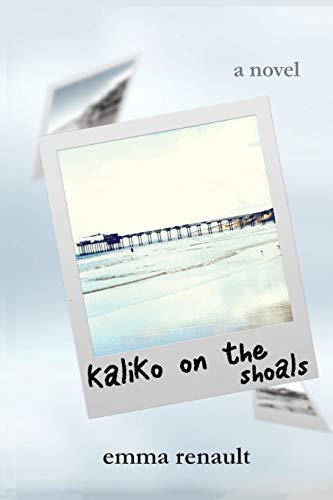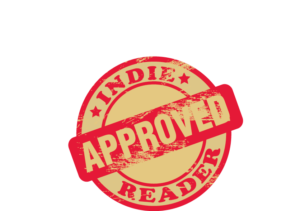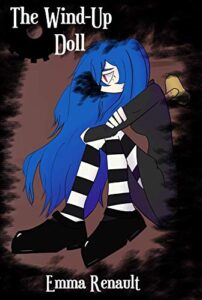Kaliko On The Shoals received a 4+ star review, making it an IndieReader Approved title.
Following find an interview with author Emma Renault.
What is the name of the book and when was it published?
Kaliko On The Shoals and it was published on August 4, 2020.
What’s the book’s first line?
“A year before her wedding, Kaliko swam out past the shoals.”
What’s the book about? Give us the “pitch”.
It’s about a college-age lesbian working through sexual trauma and coming to terms with the contradictions of capitalism, told through the lens of her relationship with her long-term girlfriend.
What inspired you to write the book? A particular person? An event?
In a lot of ways, I was inspired by a past relationship of mine, but on a more general level, it’s inspired by a struggle I see so often in the LGBT community of this difficulty even imagining what one’s life should look like and how to work towards that goal. When you’re cis and straight, there’s this very strictly defined sort of life path that you can fall onto if you don’t know what you want, that you can default to, if that makes sense, whereas being gay, being trans, being mentally ill, dealing with severe trauma, you don’t really have that kind of map for your life so you have to figure out for yourself how you want your life to work, what you want your relationships to look like, how you’re going to survive despite the fact that you have little place in society, etc. And that’s what at the heart of this story – the struggle between developing a way of life that you enjoy, that you feel like you can live, and surviving under an unjust and violent system that forces you to work or die, and that makes that task of ‘work’ even harder the more intersections of oppressed communities you sit at.
What’s the main reason someone should really read this book?
If you’re a trans lesbian who wants a trans lesbian book that isn’t the super sanitized, ingenuine stuff you see so often in more mainstream works. Which gets into a big part of my mission statement as a writer. I’m a trans fem lesbian who writes books for trans fem lesbians. There’s so many authors out there (not naming names, of course) who write from the perspective of an outsider from those identities, those communities, but there’s so little written from the perspective of an insider for other insiders. The whole ‘outsider for outsiders’ thing leads to a lot of issues of really ingenuine and unrealistic portrayals of trans women, of lesbians, often with lots and lots of harmful ideas about us. In so many stories, we’re the butt of jokes, or a vessel for the (cis straight) author’s hangups about sexuality and gender, and that’s something I want to combat with my work. I write for the trans lesbians who don’t feel seen at all by the mainstream narrative. I’d say that’s a reason to read this book. If you’re not a trans lesbian, I guess you’d want to read it to see what our experiences are actually like, to get to understand us better.
What’s the most distinctive thing about the main character? Who-real or fictional-would you say the character reminds you of?
I’d say the most distinctive thing about Kaliko is how devoted she is to finding happiness, even when she’s in really bad situations. Even when she’s at her lowest points, there’s still this undercurrent of ‘I want to be happy’ that sometimes also manifests more as ‘I want the people I love to be happy’ but that’s still very much rooted in seeking a way to get more enjoyment out of things, to enjoy life even though life often sucks.
I’m generally not a big fan of comparing characters to each other or to real-life people, because too often that ends up in this weird place of people ending up with assumptions that don’t really apply because of something that the person making the comparison forgot (or just didn’t know) about the character or real-life person they’re comparing to that someone hearing the comparison remembers really strongly and then has this gut reaction of ‘I like this character already because of this thing!’ that then turns out to not be present but assumed because of the faulty comparison. Or the opposite, with the listener going ‘Wow, I already don’t like this character if they’re like [insert character here]’ when the thing they’re thinking of that makes them dislike that character is something that isn’t present in the character being described but the person making the comparison forgot about that aspect when they made the comparison. I generally feel like it’s easier (and more helpful) to tell someone about who a character is on that their own terms rather than trying to draw imperfect comparisons, you know?
If they made your book into a movie, who would you like to see play the main character(s)?
I’m actually mostly opposed to the idea of film adaptations, funnily enough. I know so many writers who are all about wanting movie adaptations or TV show adaptations, and who put together casts in their head for fun, but that’s an impulse I don’t really relate to. A big part of that is because of the role movies play in our culture vs. the role books play. A movie is going to reach a wider audience because it’s easier for most people to commit to watching a movie or a show than reading a book, which leads to the film adaptation often becoming culturally kind of the ‘definitive’ version. Films often replace books in the general cultural consciousness, and like, that’s not necessarily ‘wrong’ in all cases. It’s just something I’m not comfortable with because it’s, in a lot of ways, someone else’s vision of my work replacing my own vision of my work. Not to mention the level to which I don’t trust Hollywood with trans lesbian stories. I mean, look at the track record!
When did you first decide to become an author?
God, that’s a difficult question. There’s a big level where I feel like it’s a permanently ongoing decision, a choice that I make again and again on a regular basis, and a decision I’ve made probably a hundred times throughout my life. There’s also the difference between that kind of decision made without understanding the ramifications of it and that kind of decision made while knowing what you’re getting into, while understanding everything that comes with it. You could say I decided to be an author when I said it aloud when I was nine years old, but I wouldn’t say that really counts the same way as like, the kind of knuckle-down buckle-down decision that is committing to writing something, editing it, designing the cover, getting everything ready for publication and actually putting it out in the world, and then even the difference between that and the decision to keep doing it. Like I said, it’s a permanently ongoing choice.
Is this the first book you’ve written?
It’s not. My debut novel, The Wind-Up Doll came out last year. It’s about a clockwork doll and a chronically ill gardener working through trauma and coping with mental illness in the idyllic countryside, and it’s available wherever books are sold!
What do you do for work when you’re not writing?
I’m currently unemployed due to COVID, but until recently I was working in a restaurant and I’ll probably do that again when the situation gets safer. I’d love to be able to make a living off my writing, but I’m not nearly there yet. Crossing my fingers for the future though, haha!
How much time do you generally spend on your writing?
I generally write for 4-6 hours per day, as often as I’m able to. I try to write 5-7k words per day, and on days where I don’t draft I spend a big chunk of the day editing, revising, or working on other writing/marketing-related stuff.
What’s the best and the hardest part of being an indie?
The best part is definitely the level of control I have over my work. Being able to write what I want and release stuff on my own terms rather than having to work to the demands of a publisher.
The hardest part is probably the amount of skills you need to pick up to publish successfully, especially as a working class person who can’t afford to dump a whole lot of money into hiring people. Learning how to do all that sort of stuff is fun, don’t get me wrong, I love it, but it’s a lot to get the hang of, especially in the beginning.
What’s a great piece of advice that you can share with fellow indie authors?
Write the story you want to tell, the story you’re passionate about. That passion will shine through and there are people out there (a lot of people probably) who are passionate about the same sort of things that you are who will love that story. Resist the urge to compromise for the sake of ‘market’ unless you’re so financially desperate that you have to, which is totally understandable as well. We’ve all got to do what we’ve got to do to survive while the many-headed beast called capitalism is still alive.
Would you go traditional if a publisher came calling? If so, why?
I wouldn’t. Traditional publishing really doesn’t serve trans women, especially those of us writing stuff featuring radical politics. Trad in a lot of ways exists to prop up the status quo of fiction writing (which isn’t to say that nothing of value is ever trad published; there’s a lot of great stuff out there that’s trad). Trad typically wants that very cishet-approved narrative of being trans, of being gay, and I’m not at all comfortable with the idea of making work like that. Trad publishing just isn’t for people like me at all.
Is there something in particular that motivates you (fame? fortune?)
I’m motivated most by the desire to get these stories out there to the people who want them. I don’t want to be famous or rich. I just want to survive, and I want the people who need the kind of stories I’m writing to be able to find and access them.
Which writer, living or dead, do you most admire?
Leslie Feinberg, without a doubt. Zie is one of my major inspirations, both as a writer and a revolutionary, and I can’t even begin to explain how much I’ve learned from hir work. Stone Butch Blues was such a revelation, both politically and artistically, this huge lightbulb moment for me, and so was Drag King Dreams, and hir nonfiction work. I owe a lot of my present day understanding of gender to hir work (I’ve joked before that I’m nonbinary because of Leslie Feinberg and Monique Wittig), and gender is one of those ‘big themes’ that’s woven through my work. Leslie Feinberg was such a powerhouse of a butch, an activist, a writer, and my admiration for hir knows no bounds.
Which book do you wish you could have written?
I generally don’t like this kind of question because I wouldn’t want to take someone else’s accomplishment away from them, but if I had to pick, it’d probably be Chelsea Girls by Eileen Myles. It’s such a brilliant book, both as far as content and form, and I’ve been drawing a lot of inspiration from it for some of my upcoming projects. I’d love to be able to write something that’s at the same time so gritty and messy and real and so poetic and beautiful.


